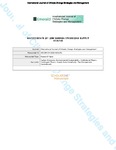ANTECEDENTS OF LOW CARBON EMISSIONS SUPPLY CHAINS
| dc.contributor.author | Luo, Z | |
| dc.contributor.author | Gunasekaran, A | |
| dc.contributor.author | Dubey, R | |
| dc.contributor.author | Childe, Stephen J | |
| dc.contributor.author | Papadopoulos, T | |
| dc.date.accessioned | 2016-11-02T19:49:20Z | |
| dc.date.issued | 2017 | |
| dc.identifier.issn | 1756-8692 | |
| dc.identifier.issn | 1756-8706 | |
| dc.identifier.other | IJCCSM-09-2016-0142.R1 | |
| dc.identifier.uri | http://hdl.handle.net/10026.1/6669 | |
| dc.description.abstract |
Purpose: The low carbon economy is the pressing need of the time. Despite several efforts taken by government and large corporations, there is still research to be conducted exploring the role of top management commitment in translating external pressures into responses that help to build low carbon emissions in supply chains. Design/methodology/approach: We have grounded our framework in institutional theory, agency theory and contingency theory. On the basis of existing literature, we have drawn four hypotheses. To test our hypotheses, we developed and pre-tested our questionnaire. Finally, we performed statistical analyses to test our research hypotheses using 176 samples gathered using pre-tested questionnaire following Dillman’s (2007) total design test method. Findings: Our results suggest that coercive pressures and mimetic pressures under mediating effect of top management commitment has significant influence on organizational response to low carbon emissions. We further note that supply base complexity has moderating effects on the link between top management commitment and organizational response towards low carbon emissions. Research limitations/ implications: Practical implications: Originality/value: Our study offers valuable insights to those managers and environmental consultants who view supply base complexity as limitations. However, our results indicate that supply base complexity may help to enhance the effectiveness of the top management commitment on organizational response towards low carbon emissions. | |
| dc.format.extent | 707-727 | |
| dc.language | en | |
| dc.language.iso | en | |
| dc.publisher | Emerald | |
| dc.subject | Carbon emissions | |
| dc.subject | Environmental sustainability | |
| dc.subject | Institutional Theory | |
| dc.subject | Contingent Theory | |
| dc.subject | Supply base complexity | |
| dc.subject | Top management commitment | |
| dc.title | ANTECEDENTS OF LOW CARBON EMISSIONS SUPPLY CHAINS | |
| dc.type | journal-article | |
| dc.type | Journal Article | |
| plymouth.author-url | https://www.webofscience.com/api/gateway?GWVersion=2&SrcApp=PARTNER_APP&SrcAuth=LinksAMR&KeyUT=WOS:000408830700009&DestLinkType=FullRecord&DestApp=ALL_WOS&UsrCustomerID=11bb513d99f797142bcfeffcc58ea008 | |
| plymouth.issue | 5 | |
| plymouth.volume | 9 | |
| plymouth.publisher-url | http://www.emeraldinsight.com/journal/ijccsm | |
| plymouth.publication-status | Accepted | |
| plymouth.journal | International Journal of Climate Change Strategies and Management | |
| dc.identifier.doi | 10.1108/IJCCSM-09-2016-0142 | |
| plymouth.organisational-group | /Plymouth | |
| plymouth.organisational-group | /Plymouth/Faculty of Arts, Humanities and Business | |
| plymouth.organisational-group | /Plymouth/Faculty of Arts, Humanities and Business/Plymouth Business School | |
| plymouth.organisational-group | /Plymouth/REF 2021 Researchers by UoA | |
| plymouth.organisational-group | /Plymouth/REF 2021 Researchers by UoA/UoA17 Business and Management Studies | |
| plymouth.organisational-group | /Plymouth/Users by role | |
| plymouth.organisational-group | /Plymouth/Users by role/Academics | |
| dcterms.dateAccepted | 2016-11-02 | |
| dc.identifier.eissn | 1756-8706 | |
| dc.rights.embargoperiod | Not known | |
| rioxxterms.versionofrecord | 10.1108/IJCCSM-09-2016-0142 | |
| rioxxterms.licenseref.uri | http://www.rioxx.net/licenses/all-rights-reserved | |
| rioxxterms.licenseref.startdate | 2017 | |
| rioxxterms.type | Journal Article/Review |


